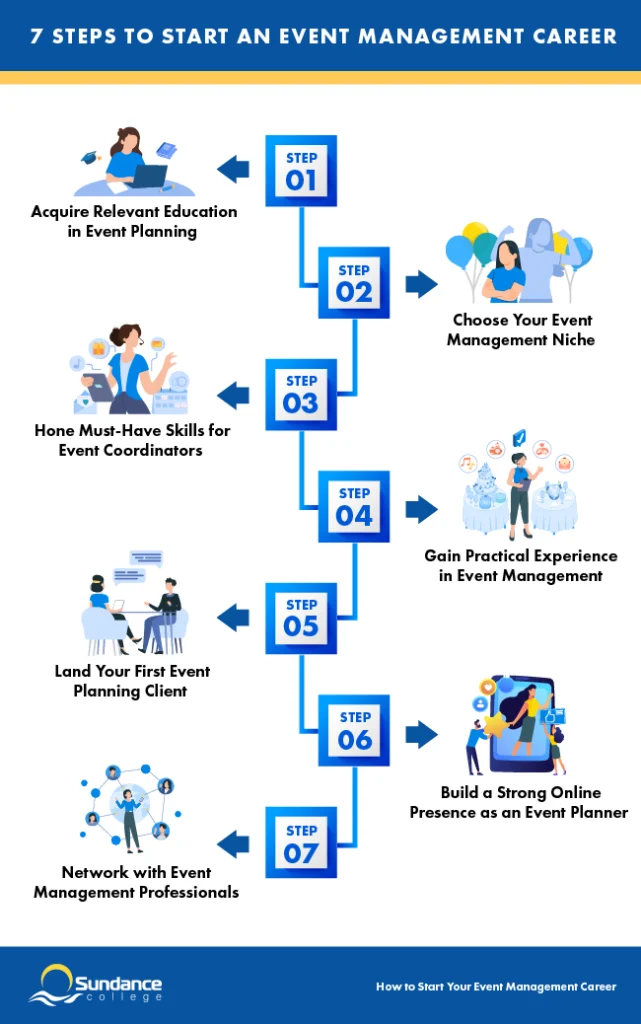Blog / How to Start Your Event Management Career
How to Start Your Event Management Career

Hospitality Business Management Diploma
- Hotel Management
- Resort Management
- Conference & Event Management
- Catering or Event Sales Coordinator
Table of Contents
Have you ever admired someone who seemed to effortlessly orchestrate an incredible event? Whether it was a bustling fundraiser, a glamorous wedding, or a dynamic conference, the person in charge seemed to handle every detail with confidence — managing schedules, solving problems on the fly, and making it all look seamless.
If you’ve ever wondered how to step into that role yourself, you’re not alone. Event management is an exciting and rewarding career that combines creativity, organization, and leadership. But how do you get started if your experience so far has been limited to managing office meetings or planning family events?
With the right training and guidance, you can develop the skills needed to succeed in this fast-paced industry. Whether you’re starting fresh or looking to translate your existing skills, this article will walk you through 7 practical steps to begin your event management career.
Listen to “How to Start Your Event Management Career”
What is Event Management?
Event management involves planning, organizing, and executing events of all types and sizes. From corporate conferences and weddings to concerts and fundraisers, event managers handle a variety of responsibilities, including budgeting, venue selection, vendor coordination, scheduling, and on-site management.
Whether it’s a small gathering or a large-scale event, their goal is to meet client expectations and create a successful event.
Skills Required to Become an Event Manager
To succeed as an event manager, you’ll need a diverse set of skills to handle the fast-paced and detail-oriented nature of the industry. Key skills include:
- Organizational Skills: Efficiently managing multiple tasks, timelines, and vendors.
- Communication Skills: Clearly and effectively communicating with clients, teams, and vendors.
- Problem-Solving Skills: Being proficient in adapting and handling unexpected challenges during events.
- Creativity: Developing unique themes and solutions to create standout experiences.
- Time Management: Prioritizing tasks and meeting deadlines under pressure.
- Budgeting: Managing event finances, including cost estimates and expense tracking.
- Technological Proficiency: Using event management software, marketing tools, and virtual event platforms.
These skills can be developed through education, hands-on experience, and continuous learning, laying a strong foundation for your successful career in event management.
How to Become an Event Planner: 7 Steps
Becoming an event planner is achievable with the right approach. Here’s an overview of the 7 essential steps to guide you into this field:
Step 1: Acquire Relevant Event Planning Education
If you’re starting from scratch, education is key. Formal programs teach event budgeting, logistics, marketing, catering, security, and project management— everything you need to start strong in event planning.
Formal Event Management Education
For beginners, enrolling in a hospitality business management program is a great start. Institutions like Sundance College offer diploma programs that cover:
- Budgeting and Finance: Managing costs and contracts.
- Sales and Marketing: Promoting events and engaging audiences.
- Logistics: Coordinating vendors and timelines.
- Event Planning Software: Using tools like Cvent or Eventbrite to schedule and manage events.
This education will give you the skills to take on roles in event planning and grow your career.
Event Management Certifications
You can earn two types of certifications while studying event management:
- Certificates through the Hospitality Business Management Diploma Program
Students in Sundance College’s Hospitality Business Management (HBM) program can earn an American Hotel & Lodging Educational Institute (AHLEI) certificate for each course completed with a grade of 70% or higher. These certificates build expertise in key hospitality areas like:
- Hospitality Computer Systems
- Hospitality Sales and Marketing
- Front Office Management
- Hotel and Restaurant Accounting
- Hotel/Motel Security Management
- Managing Food and Beverage Operations
Professionals who earn these AHLEI certificates demonstrate specialized expertise in essential hospitality and event management skills, making them more competitive in the job market.
- Optional Event Management Certifications
To further advance your career, you can pursue optional industry-recognized certifications requiring additional experience and training, such as:
- Certified Meeting Professional (CMP): 2+ years of experience and additional exams.
- Certified Special Events Professional (CSEP): 5+ years or industry experience.
- Certified in Exhibition Management (CEM): Completion of 9 out of 13 specific courses.
- Certified Professional in Catering and Events (CPCE): 3 years of catering/events experience and 30 hours of professional development.
These advanced credentials are optional and can be pursued later in your career if you wish to build expertise in specific areas of event management.
Step 2: Identify Your Event Management Niche

Event management is broad, with many specialized areas. Social events and corporate events are very different worlds, so narrowing down your niche will help you develop the right skills.
Popular Event Planning Specialties
Event management includes a variety of specialties, each with unique demands. Here are a few popular ones:
- Corporate Events: Conferences, seminars, product launches, team building.
- Weddings: Detailed planning from event venue to décor, requiring creativity.
- Festivals and Concerts: Managing logistics, crowd control, ticketing, performances.
- Non-Profit Events: Engaging events for fundraising and awareness.
- Trade Shows: Organizing booths, exhibitors, and creating attendee experiences.
By identifying your niche, you can tailor your skills to meet specific client needs and stand out in that area.
What to Expect in Your First Event Management Role
In your initial event planning role, you might assist experienced planners or coordinate smaller events. Be ready to learn the ropes, manage logistics, and build relationships with vendors. Some common job titles you might pursue include:
- Event Coordinator: Assists with the overall planning and execution of events.
- Event Assistant: Provides administrative support to senior planners.
- Venue Coordinator: Focuses on the logistics and operations for specific event venues.
- Catering Coordinator: Manages food and beverage services for events.
These roles provide valuable hands-on experience that will help you advance in your career.
Step 3: Hone Must-Have Event Management Skills
Successful event coordinators possess a unique mix of skills, such as:
- Organization: Tracking numerous details and timelines.
- Communication: Conveying ideas and instructions clearly.
- Problem-Solving: Addressing challenges on the fly.
- Creativity: Creating engaging and memorable experiences.
Hone these business management skills through workshops, online courses, or practical experience.
Step 4: Gain Practical Experience in Event Management
Practicum is a great way to get hands-on experience and learn the inner workings of event planning such as managing budgets, coordinating logistics, and handling unexpected challenges. Make sure that when choosing your event management training, your program includes a practicum in your niche.
Volunteer experience can also help enhance your resume and grow your network. Assisting local event planning companies or non-profits with their events can provide additional insights into the industry.
Step 5: Secure Your First Event Planning Client

Once you feel confident in your abilities, it’s time to secure your first client. Start by offering your services to friends, family, or local businesses. You can even volunteer to organize small-scale events like community gatherings or family parties.
These early projects will help you build a portfolio, which is essential to showing future clients what you’re capable of.
Step 6: Establish a Strong Online Presence
After a few successful events, it’s time to build a professional online presence.
Create a website that highlights your services, showcases your portfolio, and includes testimonials from past clients. Social media is also a valuable tool — use platforms like Instagram, YouTube, LinkedIn, and Facebook to share photos and stories from your events, engage with potential clients, and connect with industry professionals.
A polished online presence will help build your credibility and expand your reach.
Step 7: Network with Event Management Professionals
Networking is key to growing your career in event management. Attend event industry conferences, workshops, and meetups to connect with other professionals.
Joining event planning associations or online communities can also lead to collaborations, referrals, and mentorships. Building relationships within the industry is key to learning from others’ experiences and growing your opportunities.

Your Event Management Career: How Sundance College Can Help
By following these seven steps, you can confidently launch your career in event management and create a rewarding future in this exciting field.
Begin with the first step – enroll in the Sundance College Hospitality Business Management program, which includes a 5-week practicum for hands-on experience. This program equips you with essential skills like hospitality computer systems, front office management, and food and beverage operations — key foundations for success in event planning.
Fill out our quick contact form to get started, stay dedicated, and watch your passion for event planning grow into a successful career!
Related Blogs
Subscribe for more career advice
Blog Categories
Share on:
